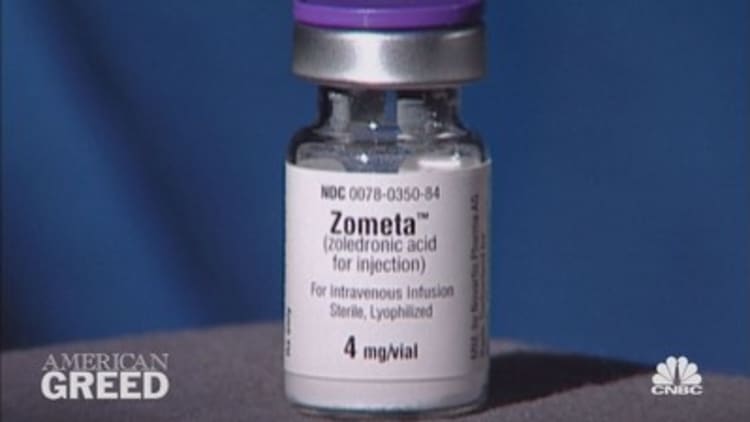Your doctor has given you the worst news imaginable: You may have cancer.
He refers you to a prestigious clinic headed by a renowned specialist who confirms the diagnosis and prescribes aggressive treatment starting immediately.
Stop. Be honest. Would you proceed? Or would you ask for a second opinion?
A 2010 Gallup Poll found 70 percent of Americans were confident in their doctors' advice and saw no need to get a second opinion or do additional research.
At the time, that would have included Michigan autoworker Robert Sobieray. He says when he got his diagnosis in 2010 he went numb.
"Your mind goes blank and all you can think about is what's most important to you," he told CNBC's "American Greed."
"To me it's my wife sitting next to me and I just held her. I didn't know what to do."
Fearing there was no time to lose and having already endured a painful bone-marrow biopsy, Sobieray decided to trust the specialist, Dr. Farid Fata. After all, Fata had an excellent reputation. After training at the prestigious Memorial Sloan Kettering Cancer Center in New York, Fata founded a string of cancer clinics in Michigan.
Fata prescribed a course of the chemotherapy drug Zometa. The side effects were debilitating. Soon, Sobieray says, his teeth began breaking off one by one.
"About every month or two I'd lose another tooth. I had one that come out with the whole socket and all and put a hole up into my sinuses."
Fata was not alarmed, even as Sobieray's teeth dwindled down to two. The doctor suggested he see a dentist. In retrospect, it is easy to see why.
For every dose of Zometa, Fata could bill Sobieray's insurance $120. And that, it turned out, was what the treatment was all about. Sobieray did not have cancer at all. Instead, he was the victim of an unfathomably cruel scam, as told in the latest episode of "American Greed." Fata admitted falsely diagnosing hundreds of patients, bilking insurance companies and Medicare out of more than $17 million. He is serving a 45-year prison term after pleading guilty to 15 felony counts.
Sobieray is still recovering from his treatments, and now wishes he had taken an extra step after his doctor's initial diagnosis.
"Don't believe him. Go get a second, a third opinion. Doubt him. Every doctor you meet, doubt that doctor. I will never trust one doctor again," he said.

Thankfully, evil doctors like Fata are rare. But that does not mean you should blindly trust your doctor.
Cardiologist Neica Goldberg, director of the Joan Tisch Center for Women's Health at NYU Langone Medical Center, says patients should not be bashful. In fact, she often encourages her own patients to seek outside advice.
"You shouldn't be nervous to ask for a second opinion," she told "American Greed." "You should do it politely. And often times when I see a patient of mine is not clear, and is concerned, or may not schedule a procedure or a test, I suggest to them, why don't you get a second opinion."
She says a second opinion is not only valuable to the patient. It can also help doctors in prescribing the correct treatment.
"If someone goes for a second opinion and it's very different from one of my recommendations, I make sure that it wouldn't put the patient at harm, and then consider trying it out. And if it doesn't work, reassess."
If you do decide to seek another opinion, Goldberg offers some tips:
• Get organized. Make certain your second opinion doctor has all of the pertinent medical records from your initial doctor. "If you don't have all the information, the doctor can't do a good job in giving the second opinion," Goldberg said. It can take time to get those records forwarded, so make the request as soon as you start to consider it.
• Don't be afraid to ask questions, both of your original doctor and the one providing the additional opinion. "There has to be an active give and take," said Goldberg.
• Talk to your insurance company. Many will authorize and even encourage a second opinion at no additional out-of-pocket cost. Also, many employers will now pay for second opinions as an employee benefit.
• Realize that not every diagnosis lends itself to a second opinion. That includes medical emergencies. "The time when it's not safe to get a second opinion is if you're in an emergency room actively having a heart attack," Goldberg said. "There's no time for a second opinion. You have to get the doctors in the hospital to take care of your heart attack."
Fata will never practice medicine again. And it's a fair bet that your own doctor truly has your best interests at heart. But it doesn't hurt to make sure. If nothing else, that added peace of mind has some great healing properties.
Correction: This story was revised to correct that Sobieray's diagnosis was in 2010.
All New "American Greed" Monday, June 26 10P ET/PT on CNBC.



